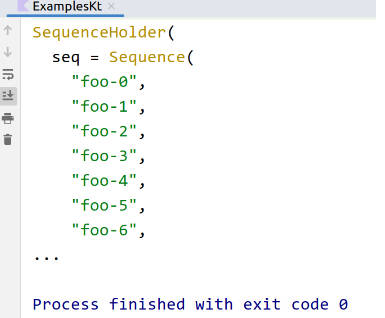One of the great features of Kotlin data classes is
their copy method. But using it can become cumbersome very
quickly, because you need to repeat the name of the field before and after.
data class Person(val name: String, val age: Int)
val p1 = Person("Alex", 1)
val p2 = p1.copy(age = p1.age + 1) // too many 'age'!
What can KopyKat do?
This plug-in generates a couple of new methods that make working with immutable (read-only) types, like data classes and value classes, more convenient.
Mutable copy
This new version of copy takes a block as a parameter. Within that block, mutability is simulated; the final
assignment of each (mutable) variable becomes the value of the new copy. These are generated for both data classes and
value classes.
val p1 = Person("Alex", 1)
val p2 = p1.copy {
age++
}
You can use old to access the previous (immutable) value, before any changes.
val p3 = p1.copy {
age++
if (notTheirBirthday) {
age = old.age // get the previous value
}
}
Nested mutation
If you have a data class that contains another data class (or value class) as a property, you can also make changes to inner types. Let’s say we have these types:
data class Person(val name: String, val job: Job)
data class Job(val title: String)
val p1 = Person(name = "John", job = Job("Developer"))
Currently, to do mutate inner types you have to do the following:
val p2 = p1.copy(job = p1.job.copy(title = "Señor Developer"))
With KopyKat you can do this in a more readable way:
val p2 = p1.copy { job.title = "Señor Developer" }
Warning For now, this doesn’t work with types that are external to the source code (i.e. dependencies). We are working on supporting this in the future.
Mapping copyMap
Instead of new values, copyMap takes as arguments the transformations that ought to be applied to each argument.
val p1 = Person("Alex", 1)
val p2 = p1.copyMap(age = { it + 1 })
Note you can use
copyMapto simulatecopy, by making the transformation return a constant value.
val p3 = p1.copyMap(age = { 10 })
Note When using value classes, given that you only have one property, you can skip the name of the property:
@JvInline value class Age(ageValue: Int)
val a = Age(39)
val b = a.copyMap { it + 1 }
copy for sealed hierarchies
KopyKat also works with sealed hierarchies. These are both sealed classes and sealed interfaces. It generates
regular copy, copyMap, and mutable copy for the common properties, which ought to be declared in the parent class.
abstract sealed class User(open val name: String)
data class Person(override val name: String, val age: Int): User(name)
data class Company(override val name: String, val address: String): User(name)
This means that the following code works directly, without requiring an intermediate when.
fun User.takeOver() = this.copy { name = "Me" }
Equally, you can use copyMap in a similar fashion:
fun User.takeOver() = this.copyMap(name = { "Me" })
Or, you can use a more familiar copy function:
fun User.takeOver() = this.copy(name = "Me")
Warning KopyKat only generates these if all the subclasses are data or value classes. We can’t mutate object types without breaking the world underneath them. And cause a lot of pain.
Using KopyKat in your project
This demo project showcases the use of KopyKat alongside version catalogs.
KopyKat builds upon KSP, from which it inherits easy integration with
Gradle. To use this plug-in, add the following in your build.gradle.kts:
-
Add JitPack to the list of repositories.
repositories { mavenCentral() maven(url = "https://jitpack.io") } -
Add KSP to the list of plug-ins. You can check the latest version in their releases.
plugins { id("com.google.devtools.ksp") version "1.7.10-1.0.6" } -
Add a KSP dependency on KopyKat.
dependencies { // other dependencies ksp("com.github.kopykat-kt.kopykat:ksp:1.0-dev") } -
(Optional) If you are using IntelliJ as your IDE, we recommend you to follow these steps to make it aware of the new code.
Customizing the generation
You can disable the generation of some of these methods by passing options to KSP in your Gradle file. For example, the following block disables the generation of copyMap.
ksp {
arg("mutableCopy", "true")
arg("copyMap", "false")
arg("hierarchyCopy", "true")
}
By default, the three kinds of methods are generated.
What about optics?
Optics, like the ones provided by Arrow, are a much more powerful abstraction. Apart from changing fields, optics allow uniform access to collections, possibly-null values, and hierarchies of data classes. You can even define a single copy function which works for every type, instead of relying on generating an implementation for each data type.
KopyKat, on the other hand, aims to be just a tiny step further from Kotlin’s built-in copy. By re-using well-known idioms, the barrier to introducing this plug-in becomes much lower. Our goal is to make it easier to work with immutable data classes.




